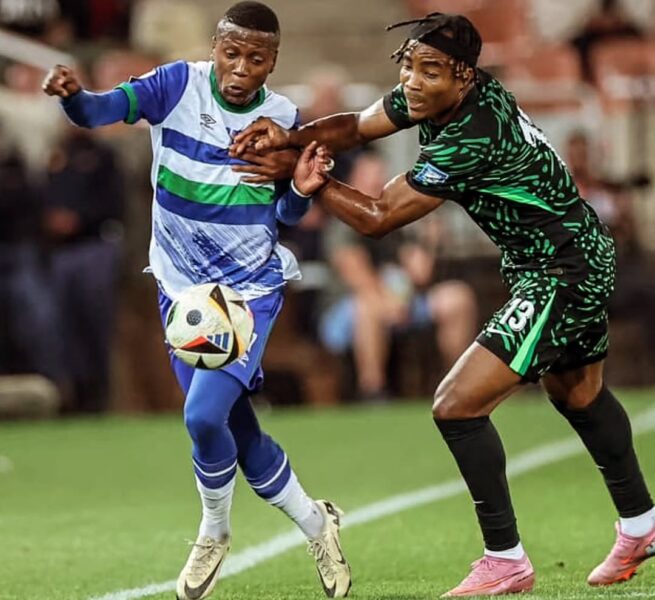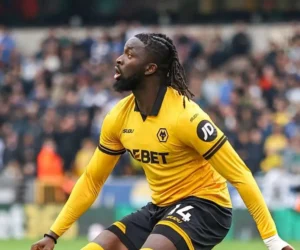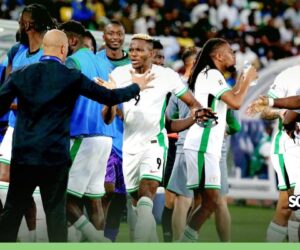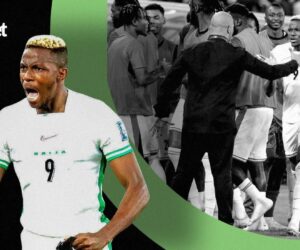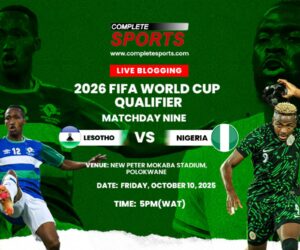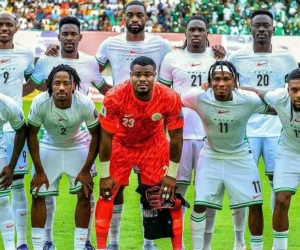

I am writing this on Thursday.
I am pregnant with the previews of the Super Eagles’ supremely crucial last two matches in the qualifying series for the FIFA 2026 World Cup, the first of which comes up tomorrow, Friday night.
There is a dilemma. I must submit my script today for it to be published and read on Saturday morning.
I will, therefore, have to play ‘prophet’ and write (and be correct) in anticipation of what I believe will happen, otherwise I will end up after the match looking either like a fool or an expert when whatever will happen in the match on Friday night happens, and my audience are reading it on Saturday morning in the newspapers, or even listening to me on my radio program on Eagle7 Sports Radio 103.7 FM Abeokuta. The fact is that Nigeria’s Super Eagles are walking a very tight rope.
Lesotho Clash: A ‘Neutral Ground’ Advantage
The match against Lesotho, ordinarily, should not be difficult for the Eagles to win considering that fate has gifted them the opportunity to play an extremely crucial away match on a ‘neutral’ ground – South Africa! Lesotho do not have a ground in their country good enough for the ‘size’ of the match.
Also Read: Sport In Geo-Politics At ‘The Platform Nigeria’ – Odegbami
On paper, therefore, this morning Nigerians should be celebrating a match that should be a stroll in the park for the Super Eagles.
The South African Factor And FIFA’s Twist
Unfortunately, South Africans would have been monitoring that match closely too. South Africa are involved in the race for the single slot allotted the five teams in the group – Nigeria, South Africa, Lesotho, Rwanda, Zimbabwe and Benin Republic.
Indeed, they were clear leaders (almost crowned winners of the group) until fate came with its bag of tricks to add drama to the setting, and offered Benin Republic and Nigeria what has turned out to be a lifeline, and kept South Africa on a cliff hanger.
FIFA deducted three points and three goals from South Africa’s scores, and gave them to Lesotho that were bottom of the table and without the possibility of qualifying even if they win their last two matches.
Nigeria’s Complicated Qualification Route
The deductions opened up the field. Nigeria, ‘dead’ already from previous poor performances, by their own standards, were gifted a glimmer of hope to qualify through a convoluted process that requires that a multitude of things happen for them to qualify. They must win their last two games with a large margin of goals, and Zimbabwe and Rwanda must make South Africa stumble in either of their own other two games.
It has become a game of chess for the Eagles, planning three wishful moves ahead by other teams playing on Friday night!
Super Eagles’ Confusing Qualification Scenario
To add to the uncertain drama, what the South Africans did during the match between the Super Eagles and Lesotho last night, NOT in Lesotho but in South Africa, could remotely affect their own chances if qualification eventually comes down to goal difference with Nigeria?
Also Read: Survival For Retired Sports Persons – Odegbami
If you are confused already in understanding the complexity of the situation as it is now, it will only get even worse trying to work out the mathematics of predicting what can happen, as I am trying to do now on Thursday night, and giving up. Am I making any sense? It is that confusing.
Super Eagles’ Scoring Challenges And The ‘Do-Or-Die’ Mindset
The chances of Nigeria qualifying are much slimmer than those of South Africa and even Benin Republic because, even when they win both of their matches and South Africa stumbles, Nigeria would still require to have scored all the goals they could not score since the qualifiers began. They have not scored more than a goal in any of the matches. It is, therefore, wishful thinking to hope that they will do so in their last two matches.
The irony is that the Super Eagles parade two of the best strikers in their frontline on the African continent, Africa’s best players of the last two seasons – Victor Osimhen and Ademola Lookman – prolific goal scorers for their European clubs.
So, winning the Lesotho and Benin Republic matches are a ‘do-or-die’ matter for the Super Eagles. The matches demand that kind of spirit and attitude.
Remembering Nigeria’s Fighting Spirit Of The Past
Unfortunately, until the last match against South Africa in Bloemfontein a few weeks ago, when we saw glimpses of the determination not to lose in their play after being a goal down, the Super Eagles had not played any of their previous matches with anything close to rekindling the kind of spirit for which the team was renowned from the early 1970s to the end of the Jay Jay/Kanu era.
This was a period that combined the physicality, speed, individual expressiveness and fight-to-finish playing style of the 1970s to the European flair, discipline and organisation of the 1990s.
The Spirit Of The 1970s: Inspired By Nwabueze Nwankwo
What we have in the current squad and era is the absence of the basic ingredients of the earlier years that were honed by how players developed organically in the hard and challenging domestic leagues of Nigerian football, a battlefield for the survival of the fittest.
Also Read: Elections In Nigerian Sports – Doomed To Fail? Going Back To The Future! – Odegbami
Suddenly, I am thinking of one player that epitomised the spirit in the football of the 1970s that birthed the ‘do-or-die’ culture of Nigerian football that we saw in players like Christian Chukwu, Muda Lawal, Sylvanus Okpala, Stephen Keshi, Henry Nwosu, Taribo West, Sunday Eboigbe, Bright Omokaro and some others.
He was nicknamed ‘Dan Vadis’, the American film actor that played the roles of a superhero in movies because of his strength and muscular physique.
The Legacy Of Nwabueze ‘Dan Vadis’ Nwankwo
Nwabueze Nwankwo led the midfield of the most dreaded team on the African continent in the early to mid-1970s – Rangers International FC of Enugu – when they emerged from the Nigeria/Biafra War. He was an officer in the Biafran army during the war. Team-mates often told us tales of his courage, hardness and single-mindedness during the war. He was a part of the birth of Rangers of Enugu and his spirit and energy must have infected the rest of the team.
Playing against him was a nightmare for opposing midfield players. He wore an unsmiling mask on his face and very fiery eyes throughout a match as he lumbered around the midfield with his rippling muscles, planting his feet into bone-breaking tackles, cursing and terrorising opponents to their hearing under his breath, hauling throws towards opposing goals like hand grenades, and releasing shots from his right foot packed with cannons.
Nwabueze Nwankwo, now late, was a ‘monster’ on the field, businesslike always, playing and leading team-mates to fight to the end as if their lives depended on winning.
How Nwankwo’s Spirit Defined The Green Eagles Era
He took that attitude and spirit to the Green Eagles in the mid-1970s and it became the culture of Nigeria’s national team – always difficult to play against because of their physicality, fighting spirit and determination to win!
Even when the national team lost, it was never because they did not fight till the end! They would leave the field having covered every inch of grass, marked with scars from the battle.
Channeling Nwankwo’s Spirit For Today’s Super Eagles
That is how the Super Eagles need to play these last two games. I hope they did last night. I hope they made Lesotho taste the poisoned chalice of Nwabueze Nwankwo.
The Eagles need to win these last two matches, win them well and leave their eventual fate to the universe. It will no longer be in their hands but in those of the gods.
May the elements help the Super Eagles

